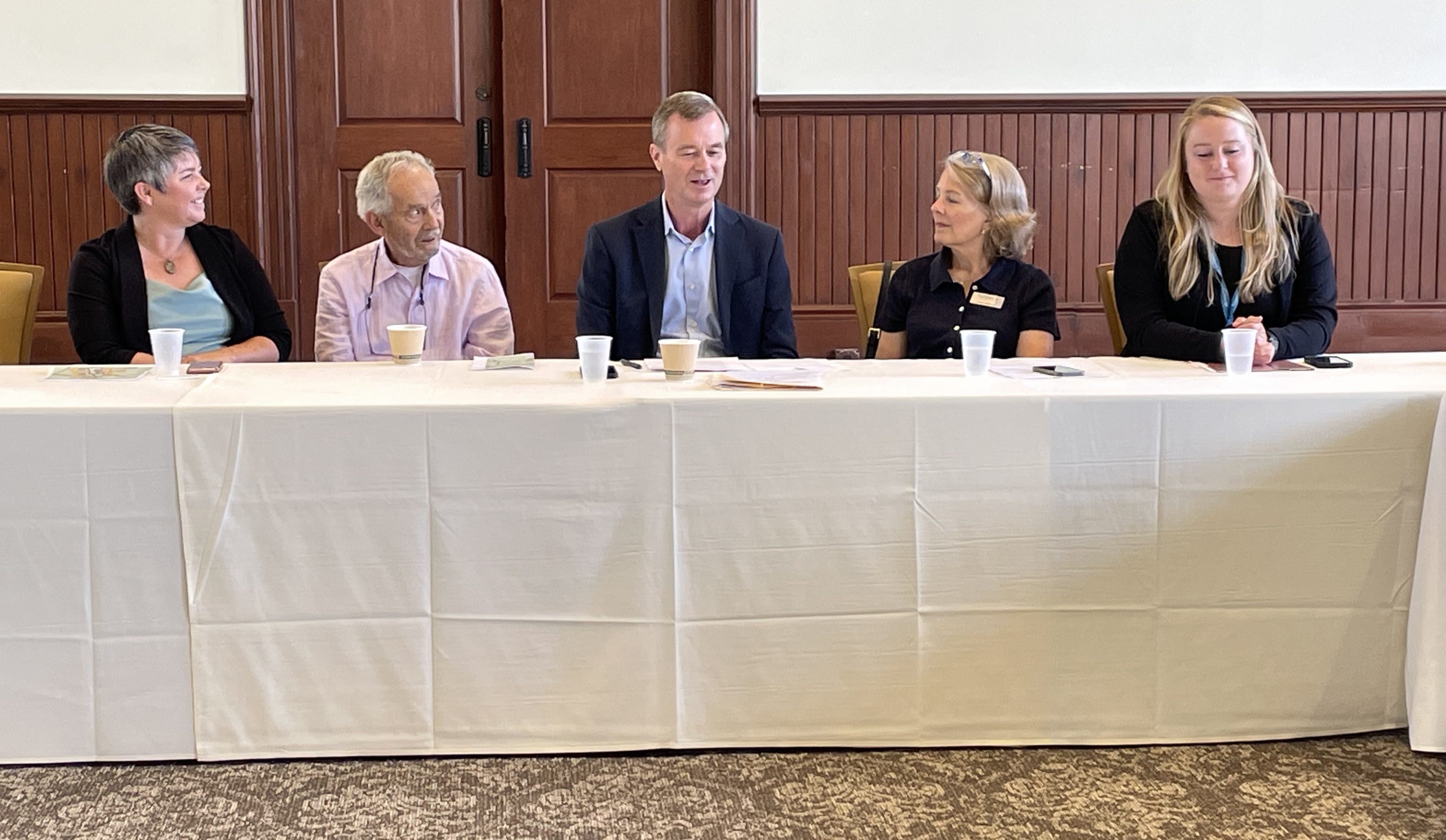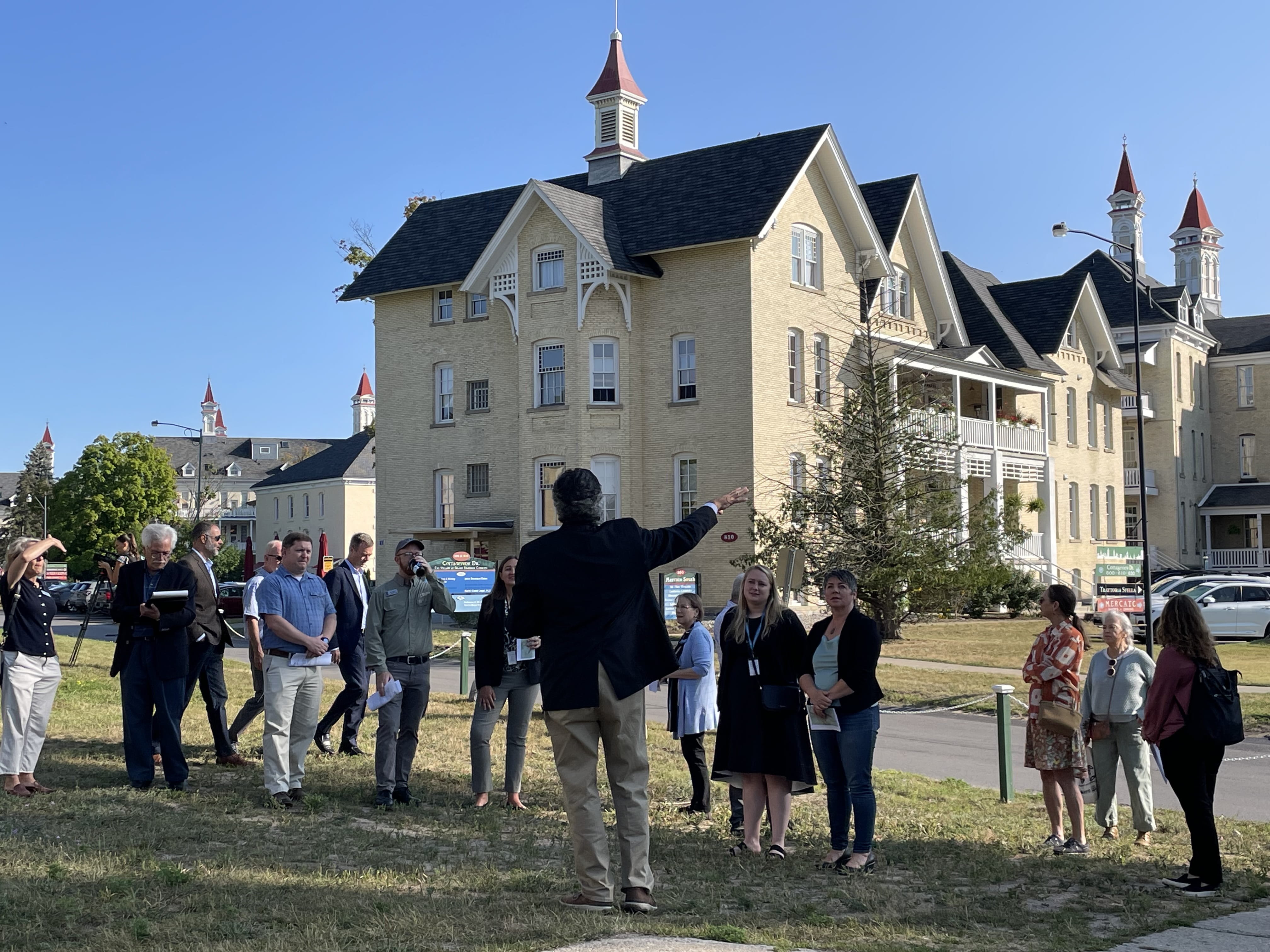The web Browser you are currently using is unsupported, and some features of this site may not work as intended. Please update to a modern browser such as Chrome, Firefox or Edge to experience all features Michigan.gov has to offer.
The Village at Grand Traverse Commons: Transforming communities, transforming environments
August 15, 2024
In communities across Michigan, EGLE is transforming sites that were once abandoned and considered unusable into vibrant places for Michiganders to live, work and play. Thanks to Governor Gretchen Whitmer’s prioritization of these investments, EGLE’s Brownfield Program has provided more than $151 million in brownfield grants, loans, and incentives to 359 sites across 50 communities, supporting over 19,229 jobs and $7.3 billion in private investments since 2019.

State Rep. Betsy Coffia; Raymond Minervini of Minervini Group; Phil Roos, EGLE director; Sue Wenzlick of contractor Fishbeck; and Sydney Hart, EGLE's legislative liaison at the Village at Grand Traverse Commons event.
“Investing in these initiatives can breathe new life into local communities, support economic opportunity and small businesses, offer vibrant spaces for the community to use and enjoy, and create tourist destinations in our state,” said EGLE Director Phil Roos. “Redevelopment investments are about creating healthy, safe and flourishing environments that will last for generations.”
Brownfield investments are about more than renovating blighted spaces; They revitalize local areas, create jobs, foster small business growth, and provide vibrant community spaces for residents and tourists to gather and enjoy. An example of the positive impacts of brownfield investments is The Village at Grand Traverse Commons, the former Traverse City State Hospital.
The Traverse City State Hospital shut down in 1989 and was vacant for more than a decade. The interior, exterior and mechanical systems were coated with lead paint in unusually high concentrations. The building needed to be remediated, but also preserved to maintain the historical character. The site also had contaminated soil from exterior paint projects, vehicle and machine storage, and repairs.
The state invested nearly $3 million through a grant-and-loan package, making it possible to safely redevelop the buildings and grounds into an active community space with residents, offices, restaurants, shops, galleries and events. Lead paint abatement, costing $10 per square foot, was needed for 700,000 square feet of wall space. The cleanup led to a total of $182 million in investments in the property, increasing the tax base by $24 million and supporting the creation of 782 jobs.
Director Roos brought together EGLE staff and state and local leaders on Wednesday, Aug. 14 for a tour of The Village at Grand Traverse Commons and a roundtable discussion. The group talked about the importance of brownfield investments, how EGLE can continue to be a good partner and Michigan’s commitment to rebuilding communities, protecting the environment and boosting local economies.

Tour of The Village at Grand Traverse Commons.
"Brownfield projects are key in the repair and revitalization of Traverse City," said Traverse City Mayor Amy Shamroe. "Projects like The Commons only enrich our community by restoring existing spaces and cleaning up forgotten places. Without brownfield investments from local and state partners like EGLE, Traverse City would not be the beautiful place it is today."
Just last month, Governor Whitmer announced the U.S. Environmental Protection Agency (EPA) awarded Michigan $129.1 million from the Inflation Reduction Act’s (IRA) Climate Pollution Reduction Grant (CPRG) program to accelerate the deployment of renewable energy like wind, solar and storage. The investment will help Michigan meet its 60% renewable energy and 100% clean energy standards set under the MI Healthy Climate Plan. This funding will allow the state to launch Renewables Ready Communities (RRC). Administered by the EGLE, the program will incentivize the permitting of renewable energy projects through local processes. One strategy includes the creation of the Brownfield Renewable Energy Pilot program, which will provide grants for renewable energy projects and incentivize deployment on brownfields.
Brownfield investments, like The Village, are made possible through local partnerships, federal funding and state investments. EGLE’s Brownfield Program collaborates with communities and developers to create economic opportunity by putting contaminated properties back into productive use while protecting human health and the environment. The program provides technical guidance and financial incentives to evaluate and mitigate environmental risks, relying on scientific data to ensure the best long-term outcomes and stewardship of tax dollars. To learn more, please visit the Brownfield Program website.